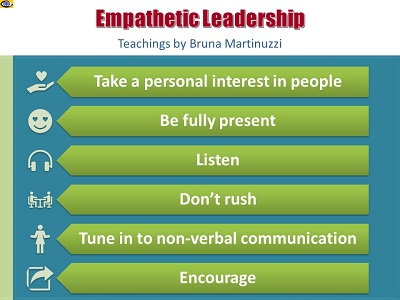| |
|
Leadership: What's Empathy Got to Do With It?
By: Bruna Martinuzzi
|
|
 |
| |
|
Empathy is your
ability to identify and understand another’s
situation, feelings and
motives
|
|
|
 |
A
leader can never be happy until
his people are happy. |
<
Genghis
Khan |
 |
You can make more friends in two months by becoming interested in other
people than you can in two years by trying to get other people interested in
you. |
Dale
Carnegie |
| |
|
Here are a few practical tips
you
might consider to help you develop capacity for empathy:
|
|
|
 |
|
②
Don't interrupt
people.
Don't dismiss their concerns offhand. Don't rush
to give advice. Don't change the subject. Allow
people their moment.
③
Tune in to
non-verbal
communication.
This is the way that people often communicate
what they think or feel, even when their verbal
communication says something quite different. |
|
| |
|
④
Practice the 93% Rule
We know from a famous
study by Professor Emeriti, Albert Mehrabian of UCLA, that
words – the things we say – account for only 7% of the total
message that people receive. The other 93% of the message
that we
communicate when we speak is contained in our tone of
voice and
body language.
|
|
|
| |
It's important,
then, to spend some time to understand how we
come across when we communicate with others.
A simple thing
like frowning or a raised eyebrow when someone
is explaining their point of view can disconnect
us from the speaker and make us appear as though
we lack understanding. |
|
|
| |
|
⑤
Use People's Name
Also remember the names of
people's spouse and children so
that you can refer to them by
name.
|
|
|
 |
|
⑥
Be fully present when
you are with people. Don't check your
email, look at your watch or take phone calls
when a direct report drops into your office to
talk to you. Put yourself in their shoes. How
would you feel if your boss did that to you.
⑦
Smile at
people. |
|
|
 |
Empathy means challenging your
preconceived ideas and setting aside your sense of what you think is
true in order to learn what actually is true that people aren’t
conscious of. |
Tom Kelley
IDEO |
|
|
❽ |
Encourage people, particularly the quiet ones,
when they speak up in meetings. A simple thing like an
attentive nod can boost people's
confidence. |
|
❾ |
Give
genuine recognition and praise.
Pay attention to
what people are doing and catch them doing the right things.
When you give praise, spend a little effort to make your
genuine words memorable: "You are an asset to this team
because…."; "This was pure genius"; "I would have missed
this if you hadn't picked it up."
|
|
❿ |
Take a
personal interest in people.
Show people that you
care, and genuine curiosity about their lives.
Ask them questions about their hobbies, their
challenges, their families, their aspirations. |
|
|